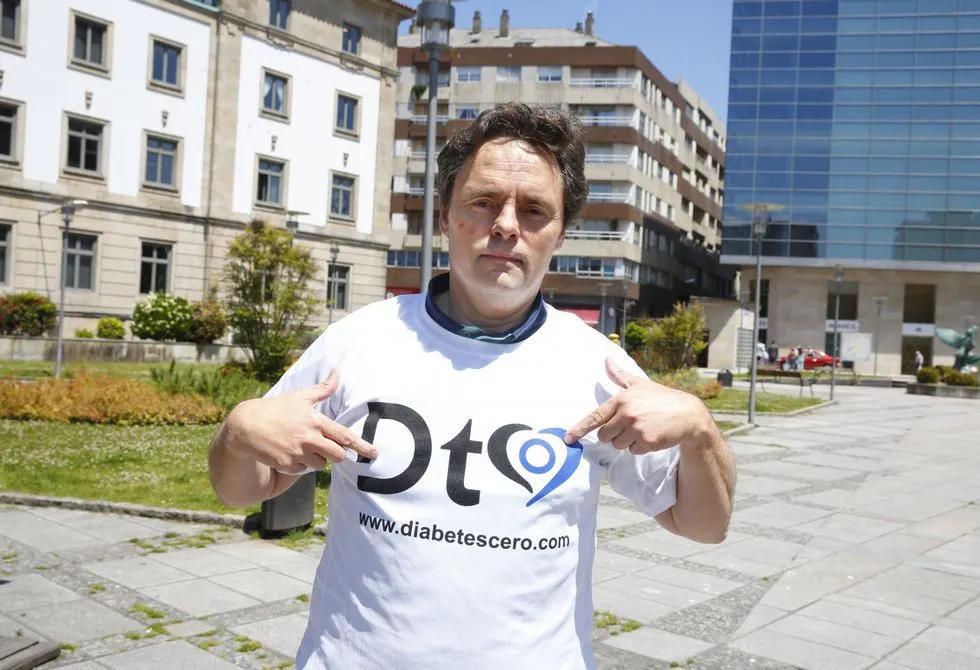Salva Budiño Martínez (Aldán-Cangas do Morrazo, 1962) is the visible face of the Diabetescero Association (DT0) in Pontevedra.They themselves define themselves as a movement of parents of diabetic children and adults with this disease whose objective is the monitoring and financing of a "real and lasting" investigation to give a definitive solution to this ailment.
It is a national group that started in 2014 by the hand of the restlessness of some parents in Andalusia.In that autonomous community and in cities such as Seville or Malaga is where it has greater implementation.And how does Diabetescero get to Pontevedra?Salva Budiño explains it.«When my son with 6 years debuted - as it is said paradogically - in type 1 diabetes I started looking for information and discovered the internet association.I was interested in the approach and I sent them a letter.They answered me, they convinced me and decided to add.
In the city there is already an association of children with diabetes, anedia, to which Budiño and his family also belongs.It emphasizes that these associations are necessary because they contribute to make the disease visible, but emphasizes that the purpose of diabetescero is another: research in hospitals and public institutes.They want to avoid pharmaceutical control.
At the moment they are not based in the city, but they hope to have a space in the old Xunta delegation in Benito Corbal."We want to create a working group to organize events with which to raise funds," he says.The first initiative that Diabetescero has carried out is its presence to the xopere of the health area of Pontevedra and or Salnés.What they are looking for is to be known in the health field (hospitals and health centers) so that patients and family know of their existence.They will do it with a poster campaign."A month and a half ago I interviewed doctors Soto and Couceiro, director of admission and chief of Pediatrics of Chop, respectively, and the reception was very good," he says.
Everyone who wants to contact the collective or receive information can go to the Diabetescero.com website or their Facebook page.Being in charge of the association needs time and dedication.Salva Budiño assumes it.«I am an official in an institute in Tenorio (Cotobade) and luckily I have the hourly availability that other people do not have.But I decided to get involved because I believe in the project and in the investigation, ”he rises.Child diabetes is not an invalidating disease, but it does entail a total change of habits in families.He like many others lived and lives in his flesh.«My son, who is now eight years old, takes it very well, I worse.Although the disease makes them more responsible ».His greatest concern is the nights."For the day he is controlled, at night he carries a patch, which does not cover social security, and the sugar must be controlled every four or five hours so that he does not suffer hypoglycemia."
From Diabetescero, they state that in Spain there are research on the disease in Seville, Cádiz, Córdoba, Madrid, Bilbao or Barcelona.What the Association for the Future is raised is to invest in a specific investigation endorsed by experts.«There is money raised, which is not said, by the time that moment comes.We are very well advised by the Spanish Diabetes Society (SED) and the next step will be to become a foundation to give it greater legal stability, ”says DT0 delegate in Pontevedra.
Salva Budiño refers to the fact that the research on diabetes in Spain focuses on two lines.«Using a colloquial terminology, which understands everyone, a line would consist of giving the beta cells of the pancreas, which are those that produce insulin, a kind of shield, of encapsulating them so that they are protected.And the other line would bet ondeceive the immune system so that it does not attack those beta cells ».Countries like the United States carry out pancreas transplants.
Diabetes, especially type 1, more frequent in children, forces to control food and sugar levels.Sports practice is recommended.Although minors lead a normal life, their parents do not resign."Today there is no cure, but there are many lines of research and in the short or medium term you can find a definitive solution," he concludes.


